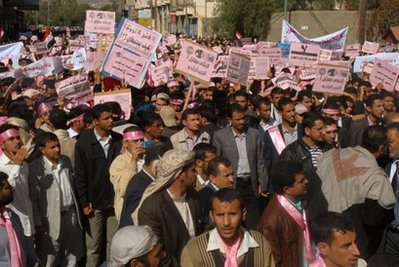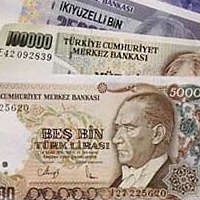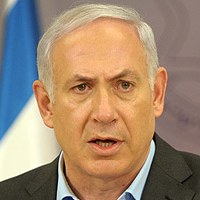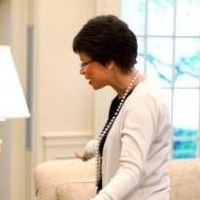![]()
Thu, Feb 03, 2011 | Ynetnews | Jerusalem Post | Xinhua News | Yemen Times | News Yemen

Yemenis attend a protest calling president Ali Abdullah Saleh to quit in Sanaa, Thu, jan 27, 2011. (AFP/Gamal Noman)
Yemen Fears Egyptian-style Protests, President Won’t Extend Presidential Term
Feb 02, 2011
Yemeni President Ali Abdullah Saleh, a key US ally against al Qaeda, said on Wednesday he will not seek to extend his presidency in a move that would end his three-decade rule when his current term expires in 2013.
Eyeing protests that brought down Tunisia’s leader and threaten to topple Egypt’s president, Saleh also vowed not to pass on the reins of government to his son, but asked the opposition to hold down on protests.
“I present these concessions in the interests of the country. The interests of the country come before our personal interests,” Saleh told his parliament, Shoura Council and members of the military.
“No extension, no inheritance, no resetting the clock,” he said, making reference to ruling party proposals to institute term limits that had been seen as allowing him to run again.
His remarks came a day before a planned large rally, dubbed a “Day of Rage”, organized by the opposition that was seen as a barometer of the size and strength of the Yemeni people’s will to follow Egypt and Tunisia in demanding a change of government.
“I call on the opposition to freeze all planned protests, rallies and sit-ins,” Saleh said.
Read full story here.
Yemen Fears Egyptian-style Protests
Feb 02, 2011
In a pro-democracy protest through the dusty streets of this Middle Eastern capital Saturday, marchers voiced hope that the revolution unfolding in the Arab world would soon reach them. “Yesterday, Tunisia. Today, Egypt. Tomorrow, Yemen,” they shouted, trying to make their way to the Egyptian Embassy.
But the small march Saturday never reached its intended target. A line of police stopped the protesters; then a loud, unruly crowd of pro-government supporters emerged, and the two groups clashed. The protesters soon vanished, their voices muffled by pro-government chants.
Saleh, who has ruled Yemen for 32 years, was clearly rattled by the anarchy unfolding in Egypt.
“The situation in different Arab countries is similar, but there’s a big difference in the enthusiasm of the people in the streets as well as the ability to go to the streets,” said Aidroos al-Naqeeb, head of the socialist bloc in Yemen’s parliament.
“In Yemen, the living conditions are far worse than Egypt. The services are far worse than Egypt,” Naqeeb said. “The anger and resentment is also larger than Egypt. But civil society is weaker here, and the culture of popular opposition is far lesser here.”
Unlike Egypt and Tunisia, impoverished Yemen has a small middle class and a large uneducated and illiterate population.
Yemen’s internal security apparatus is at least as sophisticated and deeply entrenched as Egypt’s; the army is staunchly loyal to Saleh, as are powerful tribes in a country where tribal allegiance is more significant than national identity. The opposition, while strong in numbers, is divided in its goals.
Read full story here.
Yemen reinforces forces around capital amid fear of protest escalation
Feb 02, 2011
The Yemeni Interior Ministry said in a statement it had reinforced security forces around the capital Sanaa and blocked byways as precaution measures to prevent smuggling weapons into major cities.
The ministry said on its website it directed security agencies to beef up inspection campaigns for wanted suspects or firearms at security checkpoints in the main highways leading to the capital.
The ministry’s measures came following reports that opposition parties are preparing to organize an anti-government demonstration of million protesters in Sanaa on Feb. 3 and called for their members and armed tribal supporters outside the capital to join the march, an official of the ministry told Xinhua.
Read full report here.
Locals worry violent protests will harm businesses
Jan 31, 2011
Shop owners were worried that their livelihoods would be destroyed when they heard protests on Saturday turn violent near their shops in the centre of the capital.
“We don’t want protests, we want to go about our regular business without being dragged into a political struggle,” said a fabrics shopkeeper in Jamal Street.
“It is not about us, it’s about them [politicians] so let them take it away from here. Look what is happening in Egypt,” he added.
The Yemen Times has learnt that the protest turned violent after state intelligence officials paid citizens to aggressively infiltrate the gathering. The infiltrators held their jambiyas [small Yemeni daggers] in the air and chanted for the president while threatening opposition protestors.
Read full story here.
President Saleh says Yemen not Tunisia, asks for forgiveness
Jan 23, 2011
President Ali Abdullah Saleh has asked Yemeni people to forgive him he if has made mistake and said he would not allow “creative chaos” to destroy Yemen which he said is not Tunisia.
In his speech addressing a conference of the armed forces and security leaderships held at the Air Forces headquarters in the capital Sana’a on Sunday, President Saleh called on the political forces to “return to dialogue and stop inciting chaos.”
Saleh urged opposition inside and outside Yemeni to engage in dialogue “for the sake of the country.”
“Let us transfer power peacefully and not by chaos. Yemen is not Tunisia,” Saleh was quoted as saying.
Saleh accused leaders of the opposition Joint Meeting Parties of promoting “creative chaos and sedition.”
Saleh announced an increase in salaries of armed and security forces and civil employees.
Read full story here.
For two months, the opposition Joint Meeting Parties vowed to escalate the street against elections law and constitutional amendments the ruling party’s parliamentary bloc unilaterally addressed and passed, but the the Tunisian uprising against the regime of President Zine El- Abidine, who fled the country, has given more power to the Yemeni opposition to bring the impoverished people out to the streets to express their desire to get change and better life.
The government offered simple reforms including an increase in employees’ income,, $20, and decreasing in the income tax but corruption, slow and useless reforms, increasing rate of unemployment and low income, encourage people in Yemen to follow people in Tunisia, Egypt and Algeria, where poverty rate is lower than Yemen.



 RSS
RSS










#Yemen Fears Egyptian-Style #Protests, President Won't Extend Presidential Term | #Egypt #Tunisia #Revolt http://j.mp/ik7OSU
‘Day of rage’ protest urged in Syria…
RAMALLAH, West Bank — Syrian opposition groups are using Facebook and Twitter sites to call for a “day of rage” protest in the country Friday. Drawing inspiration from the Internet-savvy Egyptian protesters, an on-line campaign called……